#english history
Text


The Smallest Man Who Ever Lived by Taylor Swift x The Six Wives of Henry VIII
#😘😘😘#the smallest man who ever lived#taylor swift#ts ttpd#ttpd#ttpd era#the tortured poets department#catherine of aragon#anne boleyn#jane seymour#anne of cleves#katheryn howard#katherine parr#henry viii#tudor history#the tudors#english history#tudor era#tudor england#katherine of aragon#anna of cleves#taylorswift#tudor period#tudor#six wives of henry viii#the six wives of henry viii
40 notes
·
View notes
Text
"Burginda’s letter is instructing the young man in his spiritual endeavours, and the contents of the (albeit short) letter reveal that she was highly educated and well-read. Written in a period that many still refer to erroneously as an intellectual ‘Dark Ages’, Burginda’s letter uses Greek words, utilises biblical exegesis, imitates Christian poetry like the fifth-century Psychomachia of Prudentius, and references both the sixth-century Italian poet Arator and the classical Roman poet Virgil. It also contains a reworking of a description of heaven found in a Latin poem from Africa that dates to c. 500. Burginda was clearly a very well-read intellectual.
This letter can be used as an example to refute many popular misconceptions about the early middle ages. The first misconception is that antique texts were neglected or unknown in this period. The second misconception is that medieval women were uneducated and unintellectual. The third misconception is that there was little or no intellectual transmission between Africa and Europe in this period. Burginda’s letter proves all these assumptions false. Not bad for two paragraphs of Latin."
#burginda#history#women in history#women's history#8th century#england#english history#female writers#herstory#middle ages#medieval#medieval women
444 notes
·
View notes
Photo

Have you ever heard of Priest Holes? Well, if you live in England, check your attic, b/c you may have one. Once upon a time, it was illegal to be Catholic in England.

King Henry VIII needed a male heir & blamed Catherine of Aragon, his 1st wife, for not giving him one. On these grounds, he asked the Pope for an annulment, which was refused, so Henry founded his own church (the Church of England). And because he was King, the entire country was required to convert to his new religion.

It was high treason for a priest to even enter England. Priest Holes are pretty much what they sound like: Small, tucked-away medieval cubbies where Catholic families could hide their priests.

They had to be small, b/c priest hunters were out to find the heretics. They were no taller than four feet, wedged in any space in the house that could discreetly accommodate them.

When priest hunters became wise to these hidden spaces, they would wait until the families thought they had gone, and then seize the priest when he came out. Some homes like this one, had multiple Priest Holes.

This one, formerly a medieval sewer, was found under a kitchen.

This man found one in the wall of his home.

Here’s one that was found above a bread-oven, in the thickness of the chimney stack.

Nicholas Owen was a carpenter who specialized in building Priest Holes. Owen worked alone and at night to avoid suspicion.
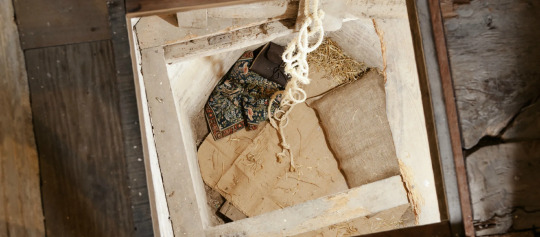
Some of his work throughout England may still be undiscovered. For example, this one, rediscovered in 1858, was not fully opened until 1910, and “still inside were a rope ladder, a small tapestry, bedding and a folding leather altar.”

Owen did eventually get caught. The first time he was discovered, in 1594, he was tortured, but did not reveal the names or locations of his fellow Catholics. He was released after a wealthy Catholic family paid a fine on his behalf, and went back to building Priest Holes.

In 1606, though, Owen was arrested again.
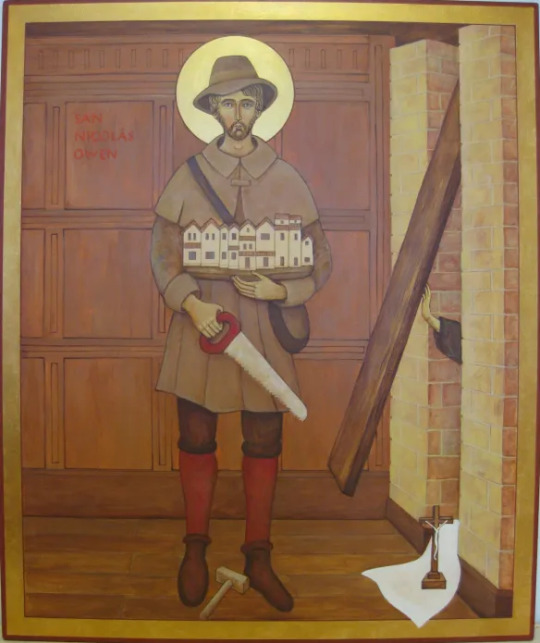
But, this time, he was tortured so badly, he died an awful death, having revealed nothing to his inquisitors. He later became Saint Nicholas Owen, the Patron Saint of Illusionists and Escapologists.
https://www.messynessychic.com/2021/03/24/another-reason-to-check-your-attic-priest-holes/
7K notes
·
View notes
Text

Been using this quote a lot since yesterday.
James Connolly was executed by crown forces in 1916. Despite a doctor saying he had two days at the most to live due to injuries sustained during the Easter Rising, he was brought by military ambulance to Kilmainham Gaol where he had to be tied to a chair to be shot, because he couldn’t stand. He was then dumped in a mass grave with the other executed leaders.
5K notes
·
View notes
Text
Time Travel Question : Murder and Disappearance Edition I
Given that Judge Crater, Roanoke, and the Dyatlov Pass Incident are credibly solved, though not 100% provable, I'm leaving them out in favor of things ,ore mysterious. I almost left out Amelia Earhart, but the evidence there is sketchier.
Some people were a little confused. Edward V and Richard of Shrewsbury are the Princes in the Tower.
#Time Travel#Famous Murders#Jack the Ripper#La Bete du Gevaudan#Gandillon Family#Werewolves#William Rufus#King William II#Edward V#Richard of Shrewsbury#French History#English History#Early Modern Europe#Victorian England#Lord Darnley#Mary Queen of Scots#Scottish History#Amy Robsart#Lord Dudley#The Sodder Children#The Somerton Man#Australian History#Prime Minister Harold Holt#Elizabeth Short#The Black Dahlia
488 notes
·
View notes
Text
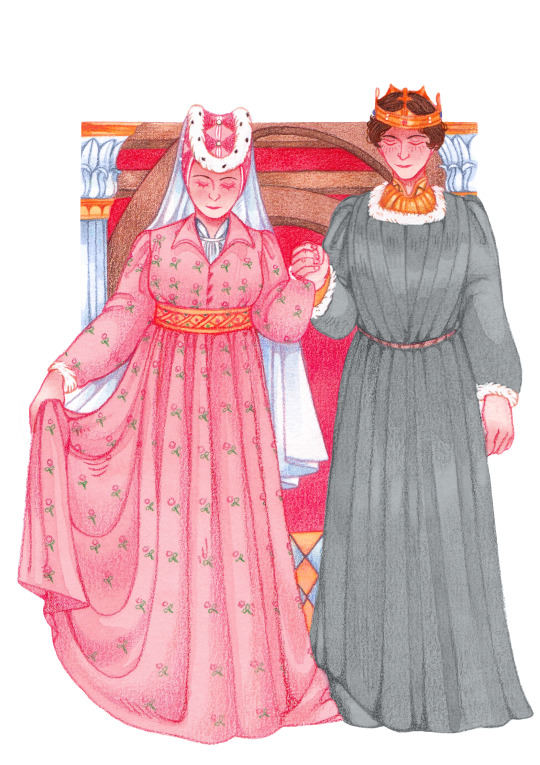
It's almost Valentine's! I was able to finish the Henry VI and Margaret of Anjou piece for my Wars of the Roses series <3
Henry VI tends to be brushed off as a mentally-ill and ineffective monarch to this day, and it's difficult to find information that does not infantalize or malign him. Margaret of Anjou, my favorite figure from this period, would was a steadfast pillar of support for Henry until the day he died. A lot of historians paint Margaret as only supporting her husband to secure the throne for their son, but I find that narrative difficult to be the only reason. Margaret campaigned for Henry's release from captivity tirelessly and worked extremely hard to gather support for his reign and even raised armies for him. While their relationship doesn't have the passion and flare that Edward IV and Elizabeth Woodville did, I think their kind of devotion is exemplary in royal diplomatic marriages from the period.
#art#wars of the roses#henry vi#margaret of anjou#english history#english costume#watercolor#colored pencil#artists on tumblr#anyway justice for henry vi every account i read of him either speculated on his mental illness or his lack of sex drive but usually both#also margaret is depicted as this like stone cold bitch thank youuuuu shakespeare
226 notes
·
View notes
Text
Why Mr. Rochester and Bertha Mason Couldn't Get a Legal Separation; or, the Utter Madness of Marital Laws
So I saw a Jane Eyre post discussing why Mr. Rochester and Bertha Mason couldn't get a legal marital separation. I've thought a lot about this topic, and in order to procrastinate writing the final for my upper-level Brontë class, I've decided to write this sort of convoluted analysis instead. I know many others have written about this subject, but I wanted to explore a bit further on my own.
Preliminary context about me, the Brontës, their Byronic inspiration, etc.: I've learned a lot about 19th century British marriage laws recently in my classes on old British literature, as well as by having studied Byron, whose marital separation in 1816 was a notorious part of his history & also reverberated through 19c literature. He refers to this separation in many of his works, most famously in his notorious poem "Fare Thee Well." Harriet Beecher Stowe, the most famous American female writer at the time, was friends with Lady Byron and wrote a book defending her called "Lady Byron Vindicated: A history of the Byron controversy from its beginning in 1816 to the present time" (the original callout post).
Insanity accusations did factor in to Byron's separation. Many scholars have remarked how the Queens of Byronic Criticism, the Brontë sisters, took significant inspiration from their well-worn copy of Moore's biography Life of Byron when creating their works. The Brontës would have been very familiar with marriage laws not only due to their knowledge of Byron's trainwreck of a marriage, but also due to being well-educated women at the time who knew that marriage was the most important economic decision of one's life and could very well make or break a person. As a result, marriage plays a significant role in their novels.
More relevant preliminary context about the novel: Jane Eyre actually takes place in the Georgian era, despite most adaptations and anaysis presenting is as a Victorian piece due to the novels publication date (this drives me crazy; same goes for the other Brontë books). Marriage laws did not change drastically from the time the novel is set to the time Brontë was writing the novel, but things were a bit different socially. Rochester was also married 15 years before his attempt to marry Jane. According to this very good analysis, Rochester and Bertha probably married in or around the year 1793: https://jane-eyre.guidesite.co.uk/timeline.
Now, here are the reasons why Rochester couldn't separate from Bertha:
1) Insanity wasn't grounds for divorce/separation in the Regency era.
Rochester himself says that he couldn't legally separate from her because of her insanity, which presumably rendered any of her faults null on the grounds of that marital vow "in sickness and in health." This is possibly one of his biggest reasons:
"I was rich enough now – yet poor to hideous indigence: a nature the most gross, impure, depraved I ever saw, was associated with mine, and called by the law and by society a part of me. And I could not rid myself of it by any legal procedings: for the doctors now discovered that my wife was mad — her excesses had prematurely developed the germs of insanity [..]"
2) Divorce was nearly impossible anyway.
There had only been around 300 divorces in English history at the time. Almost all of them were husbands divorcing their wives for committing adultery. Only a handful of divorces had succesfully been obtained by women, and they were only in cases where the husband had committed incestuous adultery or bigamy, and was extremely physically cruel. So technically after his bigamy attempt, Bertha may have had more grounds to obtain a divorce than Rochester would have, if only she were lucid enough to do so. However, in that scenario infertility would have helped their case, and Adèle's existence would have harmed their case if he attempted to seek a divorce before marrying Jane. Though as the novel explains, Adèle is probably not his, she definitely would have been used against him, as would the fact that he kept Bertha's existence a secret in England. But he wouldn't have tried for divorce that late in the game anyway, considering it was one of the most difficult options.
3) Female adultery was your best bet at divorce or separation, and this probably wasn't applicable to Mr. & Mrs. Rochester.
Although some scholars claim that there is subtext hinting that Bertha was adulterous (which some adaptations, like the 2006, include), you needed substantial proof of the adultery, which Rochester may not have had if it did occur. Being a proud man, he also wouldn't have wanted to be humiliated in that way by letting it be publicly known (as shame is one of his main reasons for hiding their marriage to begin with).
However, I lean toward the idea that Bertha may not have committed adultery. If she definitively did, seeing how affected Rochester was by Céline cheating on him (he shot her lover in revenge and left her with a stipend), if he ever suspected adultery on Bertha's part then I'm sure he would have been at court the very next day. I also think Rochester tries not to be too much of a hypocrite, and he is well aware that he himself is an adulterer, so he probably doesn't want to accuse Bertha of a crime he's committed and which he couldn't definitively prove she did.
Rochester does talk about hating Bertha's "vices" when they lived together, citing drinking, arguing, cruelty to servants, cursing, her being "unchaste," a "harlot," etc. - the last epithets, combined with her supposed lack of morality, and her being described as seductive, heavily imply that adultery could be added to her list of offenses. However, if she did truly cheat on him as well, I don't see why he wouldn't plainly tell this to Jane as well. I would imagine it would be his first complaint, and it would probably be considered his most justifiable reason against her by their cultural standards.
I don't see why he wouldn't jump to take Bertha's infidelity as an opportunity to defend his own actions, considering how open he is with Jane about his own adultery and being cheated on by Cèline Varens. While I can see how some of the textual evidence may strongly suggest Bertha's adultery, we cannot be fully certain, and that may be because Rochester himself is not fully certain. I cannot see why he wouldn't have sought legal advice on that account alone.
In short, if Bertha was an adulterer, there must have been no evidence to convict her.
Also: while the double-standard may seem odd and trivial to us, the reason why female adultery held more weight than male adultery has entirely to due with old patriarchal inheritance laws; i.e the risk of a wife getting extramaritally pregnant and passing the illegitimate child off as her husband's heir was considered too great of an affront. A man could have as many bastards as he wanted because he would know they were bastards and were not at risk of inheriting his stuff. One needed legitimate heirs to justify passing on one's ancestral wealth to. Essentially, marriage was a mere economic tool, and the economy was and is inherently patriarchal. I digress.
4) Rochester's lack of social & economic leverage, and risk of social ruin in general.
Only the wealthiest of the wealthy could obtain divorce or official separation, and it often led to social ruin. Rochester is rich, but he has no title and no great network of supporters due to being a younger son and having been abroad for most of the past 15 years (this was the length of his marriage to Bertha, stated by Mr. Briggs during the bigamous wedding attempt). He doesn't have as much leverage as Lord and Lady Byron had.
To continue on official separation, like Lady and Lord Byron obtained. Just like divorce, this was also a messy and scandalous legal proceeding, and required numerous good reasons to obtain, and being well-connected Lords and Ladies really helped your case. You also needed many witnesses and written statements as evidence. Bertha's family, as we see with Mason, would have been unhelpful to Rochester, and due to his shame and secrecy, no one could really testify on his behalf I'm assuming.
5) Unofficial separation would have been inconvenient, especially in regards to living situations.
Aside from divorce, which was extremely rare, extremely controversial, and only for the wealthiest members of society — there were unofficial and official separations. An unofficial separation was simply living apart from one another. I've often wondered why Rochester didn't simply move Grace Poole and Bertha somewhere else, but my main theory is that it would have been cost ineffective, and due to his family who were implied to be shitty, he probably really didn't want to live at Thornfield anyway so thought it would be convenient to place her there. Rochester says it would be dangerous to place her in his other residence of Ferndean:
"[..] though I possess an old house, Ferndean Manor, even more retired and hidden than this, where I could have lodged her safely enough, had not a scruple about the unhealthiness of the situation, in the heart of a wood, made my conscience recoil from the arrangement. Probably those damp walls would soon have eased me of her charge: but to each villain his own vice; and mine is not a tendency to indirect assassination, even of what I most hate."
6) Annulment was likely impossible given their circumstances.
Annulment means evaporating the marriage, acting as if it never existed, that it was a mistake. This was rare and only granted in unique circumstances, and I believe it was more common with aristocracy and royals. I believe you could possibly get an annulment if you could prove that the spouse was insane at the time of the wedding and you did not know. However, Bertha did not begin to truly deteriorate until after they had been living together for a bit. And while Rochester says that he did not know her mother was in an asylum until after the wedding, having an insane mother doesn't mean that you are insane, which Bertha clearly wasn't at that point, at least not in a way that people would have publicly acknowledged, since Rochester says she attended parties and her hand was highly sought after.
Generally, the longer a marriage had gone on, the harder it was to prove why it could not go on. Rochester says that he and Bertha "lived together" for "four years" in Jamaica while her condition deteriorated and he tried to make things work. And again, after the wedding he found out her mother was "mad, and shut up in a lunatic asylum." So we have more reasons for Rochester's difficulty: the fear of Bertha going to an asylum while she was still mostly lucid in those first four years, combined with the fact that they openly lived together and certainly must have consummated their marriage (things which would further prevent annulment), and were certainly publicly recognized as a couple in Spanish Town society, and her family wanting the marriage to continue so she could have children of "good race" i.e. to produce heirs.
Here's an important passage that to me suggests that Rochester and Bertha not only had an initial flirtation but likely consummated their marriage, likely had a passionate sexual relationship for some time, and likely implies his feelings for her were more complex than we'd initially assume, making annulment not so clear-cut of an option to him at the time:
"My father said nothing about her money; but he told me Miss Mason was the boast of Spanish Town for her beauty: and this was no lie. I found her a fine woman, in the style of Blanche Ingram; tall, dark, and majestic. Her family wished to secure me because I was of a good race; and so did she. They showed her to me in parties, splendidly dressed. I seldom saw her alone, and had very little private conversation with her. She flattered me, and lavishly displayed for my pleasure her charms and accomplishments. All the men in her circle seemed to admire her and envy me. I was dazzled, stimulated: my senses were excited; and being ignorant, raw, and inexperienced, I thought I loved her. There is no folly so besotted that the idiotic rivalries of society, the prurience, the rashness, the blindness of youth, will not hurry a man to its commission. Her relatives encouraged me; competitors piqued me; she allured me: a marriage was achieved almost before I knew where I was. Oh, I have no respect for myself when I think of that act! — an agony of inward contempt masters me. I never loved, I never esteemed, I did not even know her."
7) Spousal abandonment wasn't possible, and on some level he honored his legal and financial obligations to her and the Mason family.
Bertha's family likely refused to house her for legal and personal reasons, and spousal abandonment was forbidden due to the husband's financial responsibility as well as the law of coverture (a wife became her husband's full legal responsibility; some say "property"). Like we see in Anne's Tenant of Wildfell Hall, if a woman ran away from their spouse they would have to live in obscurity and be at risk of being sussed out. You couldn't just abandon your partner. Still, people did, because it was the easiest route to take.
But the more upper-class you were, and the more financial entanglements you had, the more inconvenient this was. We know that Rochester and his family became enmeshed with the Mason family, and he got a lot of money from Bertha, so her father likely would have taken him to court. At any rate, Rochester was legally bound to bring Bertha with him to England when he left Jamaica. If he attempted to abandon her in Jamaica, the backlash it would have brought would have brought him social ruin and foiled his chances at getting away with any bigamy attempts.
All this brings us to a further notice of Bertha's family situation. Based on Charlotte Brontë's positive comments about Rochester's character (https://www.tumblr.com/burningvelvet/731403104856195072/in-a-letter-to-w-s-williams-14-august-1848) I see no reason to suspect him, like many feminist critics do, of being an unreliable narrator or of lying about Bertha Mason's history. Everyone is entitled to their opinions, and in mine, that is simply not the novel Charlotte wrote. By her own admission, she wanted his narrative to be a path to further goodness.
It makes no narrative sense for our explanation of his and Bertha's history to be full of lies when he's trying to make ammends with Jane, who never suspects him of lying during his admission, but who does critique him and figure he'd tire of her like she was one of his many mistresses. Jane wonders if Rochester would lock her in an attic too, which he refutes on the basis that he loves her more than he loved Bertha when she was sane, and so he would care for Jane himself. Jane also tells him that it's not Bertha's fault that she's mad. So in my opinion, if Charlotte wanted us to believe Rochester was lying about his and Bertha's history to make himself look better or Bertha look worse, I don't see why she would have been vague about it, and I don't see why Jane wouldn't have called it out like she does everything else. I don't think Rochester is really a villain who locked his harmless wife in the attic for giggles; I think he weighed most of his options and found, like most people back then and even today, that keeping his problems locked up and ignored was the best solution.
Now, on with the point. I have often wondered why Rochester didn't simply "unofficially separate" from Bertha by leaving her with her family when he left. Why did he take her to England? Why didn't he just run away? It wasn't because he was an evil villain who wanted to keep her as a trophy. It's because 1) I don't think her father would have let him, as he was so quick to marry her off, 2) he felt obligated to her, and 3) it was criminal for men to abandon their wives, and it would have attracted publicity, which is what Rochester was avoiding by taking Bertha to England and sheltering her in secrecy.
Many claim that Rochester's adultery is a betrayal of his wife; and while religiously, narratively, socially, we can accept this statement, it was not legally a crime. While Rochester does honor his financial and legal obligations to his wife and her family, he does not take the religious part of the vows into account, and that's why he's cosmically punished and only rewarded after he repents, as he explains toward the end of the novel.
Another interesting point is that when Rochester recounts his decision to move back to England, he tells us that Bertha had already been declared insane in Jamaica and that she was already confined there (presumably around the 4 year anniversary before they left), meaning her father probably knew about confinement:
"One night I had been awakened by her yells (since the medical men had pronounced her mad, she had of course been shut up) — it was a fiery West Indian night; [..]"
Locking away "insane" people was standard procedure then, and if this was done with Bertha's father's knowledge, considering he locked his own wife away in an asylum, then this further absolves Rochester of a lot of the blame in my opinion. It more than likely wasn't his idea to lock her away, but the advice of "the medical men" and presumably her father's consultation as well.
8) Even if he divorced or separated from her, he couldn't remarry. Attempting these, or getting caught attempting abandonment, would have brought negative publicity that would have likely prevented the success of any future bigamy attempts. To him, secrecy and bigamy seemed better chances at securing happiness than the social ruin and likely failure the other options would have brought him.
Aside from Rochester's own explanation (which I supplied in #2 re: the separation veto inherent to Bertha's insanity), the other biggest reason as to why Rochester wouldn't seek a separation/divorce even if she hadn't been declared insane and even if he were willing to accuse her of adultery truthfully or not, is due to the fact that one could not legally remarry upon separation or divorce (unless you were Henry VIII and got God's permission lol). Rochester's impossible dream is that he wants to be married to someone he really loves, and if secrecy and bigamy are his only options then he is willing to succumb; this is shown in numerous passages:
"[..] I could reform — I have strength yet for that — if— but where is the use of thinking of it, hampered, burdened, cursed as I am? Besides, since happiness is irrevocably denied me, I have a right to get pleasure out of life: and I will get it, cost what it may."
"I will keep my word: I will break obstacles to happiness, to goodness — yes, goodness; I wish to be a better man than I have been; than I am — as Job's leviathan broke the spear, the dart, and the habergeon, hinderances which others count as iron and brass, I will esteem but straw and rotten wood."
"Is there not love in my heart, and constancy in my resolves? It will expiate at God's tribunal. I know my Maker sanctions what I do. For the world's judgment — I wash my hands thereof. For man's opinion — I defy it."
Closing remarks on the above's validity: I can't cite all my sources because a lot of this stuff I learned from lectures via my professor who specializes in 19th century English literature & history. But here's some recently published information from a historian, taken from "Inside the World of Bridgerton: True Stories of Regency High Society" by Catherine Curzon (2023):
"And if you were one of the newly-weds, you really did hope things would work out, because in the Regency till death do us part wasn't just an expression. As the Prince Regent himself had learned when he separated from his wife within eighteen months of their marriage, obtaining a divorce in Regency England was no easy matter. He never achieved it, and for those who did the stakes could be high and the cost ruinous in every sense."
"Until the passing of the Matrimonial Causes Act of 1857, which legalized divorce in the civil courts, it was governed by the ecclesiastical courts, and the Church didn't end a marriage without very, very good reason. Even these divorces didn't allow a couple to remarry, though, and they were more akin to what we would today call a legal separation, with no shared legal or financial responsibilities going forward. It was freedom, but only to a point."
"The only way to obtain a complete dissolution that allowed for remarriage was to secure a parliamentary divorce, and these were notoriously difficult to obtain. They began with a criminal conversation case, because they relied on adultery by one of the parties to make them even a slight possibility. If a woman committed crim. con., her life in polite society was over."
#jane eyre#lord byron#charlotte brontë#charlotte bronte#byronicism#marriage#divorce#marriage laws#english history#english legal history#mr. rochester#bertha mason#mr rochester#analysis#literature#english literature#history#Inside the World of Bridgerton: True Stories of Regency High Society#regency era#georgian era#19th century#1800s#victorian#Catherine Curzon#interesting#essays#the bronte sisters#the brontes
277 notes
·
View notes
Text

England's oldest door predates the rest of Westminster Abbey c.1060
#Westminster Abbey#oldest door#cathedral#London#UK#Edward the Confessor#sacred space#mediaeval#oak door#Anglo-Saxon#English history#Christendom#AD 1060
845 notes
·
View notes
Text
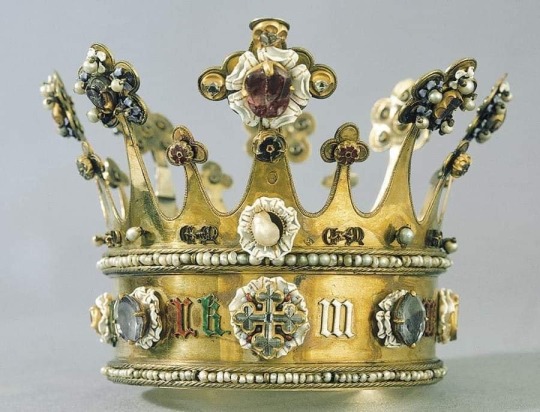
Crown of Margaret of York, 1468.
#history#english history#england#royal#royals#royalty#crown#jewel#jewels#crown jewel#gold#higginsandcole
207 notes
·
View notes
Text










Pattern Portraits of the Six Wives of Henry VIII (part one): Catherine of Aragon and Anne Boleyn
#catherine of aragon#katherine of aragon#catalina de aragon#anne boleyn#anna bolina#queen anne boleyn#tudor history#henry viii#the tudors#english history#tudor era#tudor england#tudor rose#tudor period#house of tudor#tudor dynasty#six wives of henry viii#the six wives of henry viii#art#art history#sixteenth century#16th century#16th century art#queen anne#queen katharine
31 notes
·
View notes
Text
"Dr Sarah Stark, a human skeletal biologist at Historic England, said the findings provided “evidence of a leading role for a woman in warfare on iron age Scilly.”
“Although we can never know completely about the symbolism of objects found in graves, the combination of a sword and a mirror suggests this woman had high status within her community and may have played a commanding role in local warfare, organising or leading raids on rival groups.”
Stark added: “This could suggest that female involvement in raiding and other types of violence was more common in iron age society than we’ve previously thought, and it could have laid the foundations from which leaders like Boudicca would later emerge.”"
#warriors#history#women in history#warrior women#women warriors#women's history#iron age#archeology#england#english history
424 notes
·
View notes
Photo





↳ favourite queen consorts of england
#eleanor of aquitaine#isabella of france#philippa of hainault#elizabeth woodville#anne boleyn#house plantagenet#house tudor#house boleyn#house woodville#english history#englishqueens*#anneboleynedit#historyedit#my gifs#creations*
628 notes
·
View notes
Text





Reunion
In 2021, researchers discovered that an 11th century skeleton uncovered from a grave in Otterup, Denmark in 2005 was related to a skeleton found in a mass grave in Oxford, England in 2008. DNA analysis showed them to be half-brothers, uncle and nephew or grandfather and grandson.
The man found in Oxford died young and it's speculated that he died during the St Brice's Day massacre, an attack on all Danes in England ordered by King Æthelred the Unready after an increase in Danish raids on England. The man found in Denmark died around the age of 50, having lived a farmer's life, but not one without combat.
After a century separated by the North Sea, the two relatives were reunited for an exhibition at The National Museum of Denmark.

#comic#original comic#viking age#artists on tumblr#historical fiction#valhal#archaeology#valkyrie#norse#history#danish history#english history#I'll put links in a reblog; i don't know if links still exclude posts from showing up in tags
1K notes
·
View notes
Text

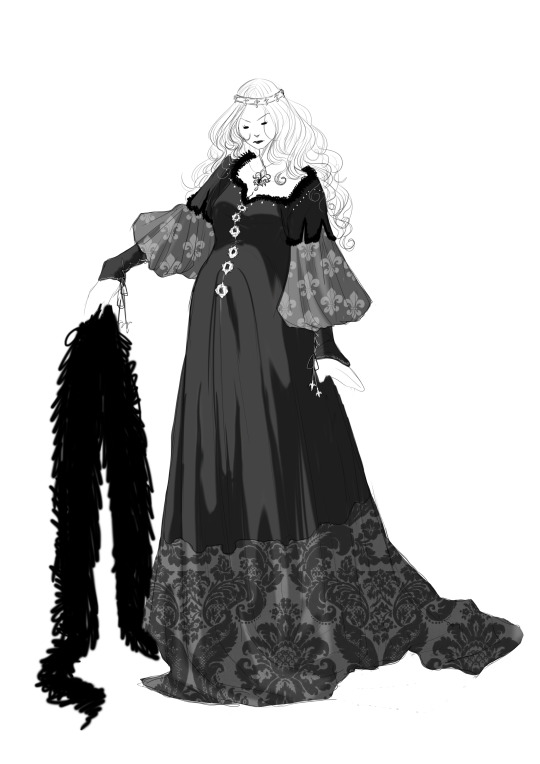

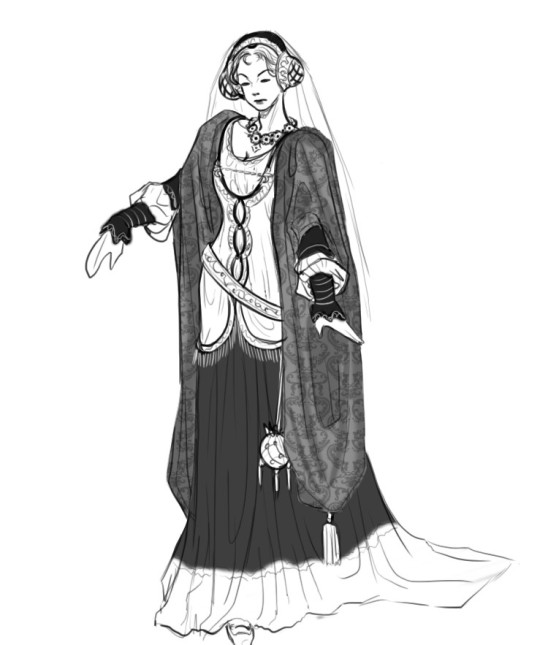
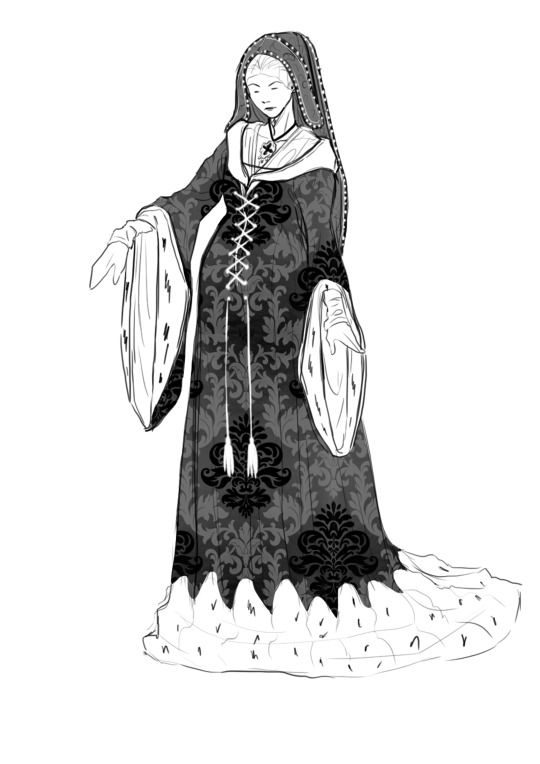
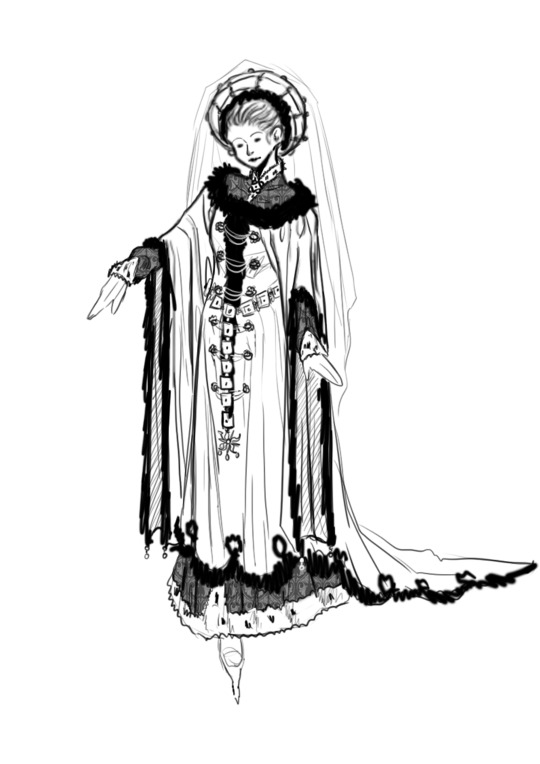
Okay, so these artworks are called
the-sketch-made-before-the-good-sketch-that-is-made-before-the-final-one-isweartoGod - final-final-final-characterdesign.psd
Life if beautiful.
#the wars of the roses#15th century#medieval#english history#historical#medieval fashion#sketch#illustration#edward iv#elizabeth woodville#elizabeth of york#henry vii#henry vi#margaret of anjou#anne beauchamp#countess of warwick#catherine of valois#isabel neville#richard iii#plantagenets#artists on tumblr#art#the white queen#the white princess
357 notes
·
View notes
Text

The feminine urge to program computers and write algorithms!
👩🏻💻💜👩🏾💻
#history#ada lovelace#computer programming#women in stem#computer#womens history#england#ai#technology#historical figures#computer history#victorian age#just girly things#femininity#london#soft girl#girl power#english history#women empowerment#historical women#girly things#girl thoughts#role model#artificial intelligence#girlboss#technology history#algorithm#nickys facts
207 notes
·
View notes
Text

Probably the most notorious lovers of the Wars of the Roses: Edward IV and Elizabeth Woodville
This was a fun one. The legend goes they met under an oak tree, and that Edward pursued Elizabeth until she agreed to marry him in secret. There's so much going on between these two figures, but it does seem that despite everything it does seem that Edward and Elizabeth had genuine affection for one another.
#illustration#wars of the roses#elizabeth woodville#edward iv#watercolor#costume history#english history#colored pencils#artists on tumblr
338 notes
·
View notes